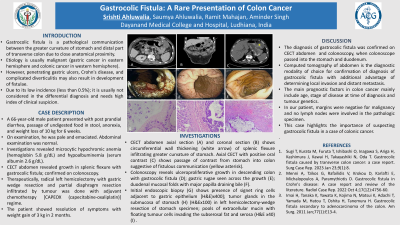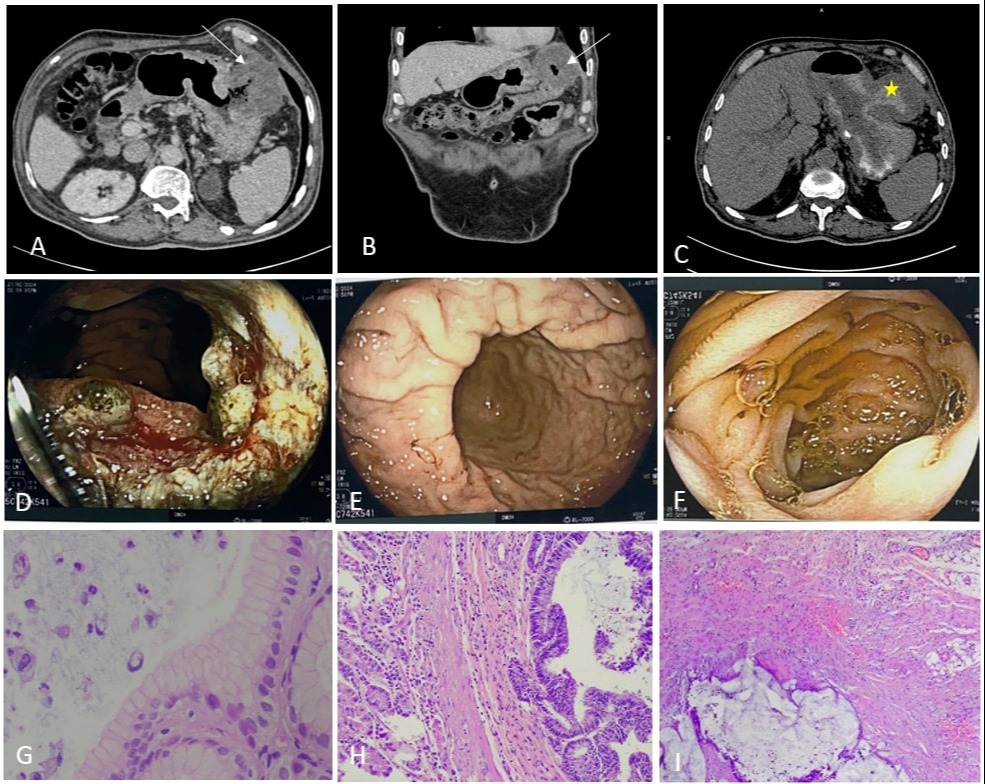Tuesday Poster Session
Category: Colon
P3725 - Gastrocolic Fistula: A Rare Presentation of Colon Cancer
Tuesday, October 29, 2024
10:30 AM - 4:00 PM ET
Location: Exhibit Hall E

Has Audio
- SA
Srishti Ahluwalia, MBBS
Dayanand Medical College and Hospital
Ludhiana, Punjab, India
Presenting Author(s)
Srishti Ahluwalia, MBBS, Saumya Ahluwalia, MBBS, Ramit Mahajan, MBBS, MD, DM, Aminder Singh, MBBS, MD
Dayanand Medical College and Hospital, Ludhiana, Punjab, India
Introduction: Gastrocolic fistula is a pathological communication between the greater curvature of stomach and distal part of transverse colon due to close anatomical proximity. The etiology is usually malignant (gastric cancer in eastern nations and colonic cancer in western nations). However, penetrating gastric ulcers, Crohn's disease, and complicated diverticulitis may also result in development of fistulae. Due to its low incidence (less than 0.5%); it is usually not considered in the differential diagnosis and needs high index of clinical suspicion.
Case Description/Methods: A 66-year-old male patient presented with post prandial diarrhea, passage of undigested food in stool, anorexia, and weight loss of 10 kg for 6 weeks. On examination, he was pale and emaciated. Abdominal examination was normal. Investigations revealed microcytic hypochromic anemia (hemoglobin 5.8 g/dL) and hypoalbuminemia (serum albumin 2.6 g/dL).
Contrast-enhanced computed tomography (CECT) abdomen revealed circumferential wall thickening of splenic flexure with passage of oral contrast from stomach into colon suggestive of gastrocolic fistula (Figure A-C). Colonoscopy revealed an ulceroproliferative growth involving splenic flexure. Once the growth was crossed, the scope passed into the stomach with visualization of gastric rugae (Figure D-F).
The patient underwent radical left hemicolectomy with gastric wedge resection and partial diaphragm resection infiltrated by tumour. Histopathology revealed pT4N0M0 mucinous adenocarcinoma of colon; stage 2 (pTNM and AJCC/UICC criteria) (Figure G-I). Adjuvant chemotherapy was given CAPEOX (capecitabine-oxaliplatin) regime. The patient showed gradual improvement with resolution of symptoms and weight gain of 3 kg in 2 months.
Discussion: CECT abdomen is the modality of choice for diagnosis of gastrocolic fistula, determining the extent of local invasion and distant metastasis. Endoscopic assessment involves both esophagogastroduodenoscopy and colonoscopy to visualise the connection between the stomach and colon. In this patient, only colonoscopy was done as the predominant symptom was diarrhoea and weight loss.
Radical en-bloc surgery and adjuvant chemotherapy is the primary treatment for colon cancer complicated by gastrocolic fistula. In our patient, margins were negative for malignancy and no lymph nodes were involved in the pathologic specimen. This case highlights the importance of suspecting gastrocolic fistula in a case of colonic cancer.

Disclosures:
Srishti Ahluwalia, MBBS, Saumya Ahluwalia, MBBS, Ramit Mahajan, MBBS, MD, DM, Aminder Singh, MBBS, MD. P3725 - Gastrocolic Fistula: A Rare Presentation of Colon Cancer, ACG 2024 Annual Scientific Meeting Abstracts. Philadelphia, PA: American College of Gastroenterology.
Dayanand Medical College and Hospital, Ludhiana, Punjab, India
Introduction: Gastrocolic fistula is a pathological communication between the greater curvature of stomach and distal part of transverse colon due to close anatomical proximity. The etiology is usually malignant (gastric cancer in eastern nations and colonic cancer in western nations). However, penetrating gastric ulcers, Crohn's disease, and complicated diverticulitis may also result in development of fistulae. Due to its low incidence (less than 0.5%); it is usually not considered in the differential diagnosis and needs high index of clinical suspicion.
Case Description/Methods: A 66-year-old male patient presented with post prandial diarrhea, passage of undigested food in stool, anorexia, and weight loss of 10 kg for 6 weeks. On examination, he was pale and emaciated. Abdominal examination was normal. Investigations revealed microcytic hypochromic anemia (hemoglobin 5.8 g/dL) and hypoalbuminemia (serum albumin 2.6 g/dL).
Contrast-enhanced computed tomography (CECT) abdomen revealed circumferential wall thickening of splenic flexure with passage of oral contrast from stomach into colon suggestive of gastrocolic fistula (Figure A-C). Colonoscopy revealed an ulceroproliferative growth involving splenic flexure. Once the growth was crossed, the scope passed into the stomach with visualization of gastric rugae (Figure D-F).
The patient underwent radical left hemicolectomy with gastric wedge resection and partial diaphragm resection infiltrated by tumour. Histopathology revealed pT4N0M0 mucinous adenocarcinoma of colon; stage 2 (pTNM and AJCC/UICC criteria) (Figure G-I). Adjuvant chemotherapy was given CAPEOX (capecitabine-oxaliplatin) regime. The patient showed gradual improvement with resolution of symptoms and weight gain of 3 kg in 2 months.
Discussion: CECT abdomen is the modality of choice for diagnosis of gastrocolic fistula, determining the extent of local invasion and distant metastasis. Endoscopic assessment involves both esophagogastroduodenoscopy and colonoscopy to visualise the connection between the stomach and colon. In this patient, only colonoscopy was done as the predominant symptom was diarrhoea and weight loss.
Radical en-bloc surgery and adjuvant chemotherapy is the primary treatment for colon cancer complicated by gastrocolic fistula. In our patient, margins were negative for malignancy and no lymph nodes were involved in the pathologic specimen. This case highlights the importance of suspecting gastrocolic fistula in a case of colonic cancer.

Figure: CECT abdomen axial section figure (A) and coronal section figure (B) shows diffuse circumferential wall thickening (white arrow) of splenic flexure infiltrating the greater curvature of stomach. Axial CECT with positive oral contrast figure (C) shows the passage of contrast from the stomach into the colon suggestive of fistulous communication (yellow asterisk)
Colonoscopy reveals figure (D) ulceroproliferative growth in the descending colon with gastrocolic fistula; figure (E) gastric rugae seen across the growth; figure (F) duodenal mucosal folds with major papilla draining bile.
Initial endoscopic biopsy shows figure (G) presence of signet ring cells adjacent to gastric epithelium [hematoxylin–eosin (H&E) x400]; figure (H) tumor glands in the submucosa of stomach (H&E x100) in the left hemicolectomy with wedge resection of stomach specimen; figure (I) pools of extracellular mucin with floating tumour cells seen, invading the subserosal fat and serosa (H&E x40).
Colonoscopy reveals figure (D) ulceroproliferative growth in the descending colon with gastrocolic fistula; figure (E) gastric rugae seen across the growth; figure (F) duodenal mucosal folds with major papilla draining bile.
Initial endoscopic biopsy shows figure (G) presence of signet ring cells adjacent to gastric epithelium [hematoxylin–eosin (H&E) x400]; figure (H) tumor glands in the submucosa of stomach (H&E x100) in the left hemicolectomy with wedge resection of stomach specimen; figure (I) pools of extracellular mucin with floating tumour cells seen, invading the subserosal fat and serosa (H&E x40).
Disclosures:
Srishti Ahluwalia indicated no relevant financial relationships.
Saumya Ahluwalia indicated no relevant financial relationships.
Ramit Mahajan indicated no relevant financial relationships.
Aminder Singh indicated no relevant financial relationships.
Srishti Ahluwalia, MBBS, Saumya Ahluwalia, MBBS, Ramit Mahajan, MBBS, MD, DM, Aminder Singh, MBBS, MD. P3725 - Gastrocolic Fistula: A Rare Presentation of Colon Cancer, ACG 2024 Annual Scientific Meeting Abstracts. Philadelphia, PA: American College of Gastroenterology.

